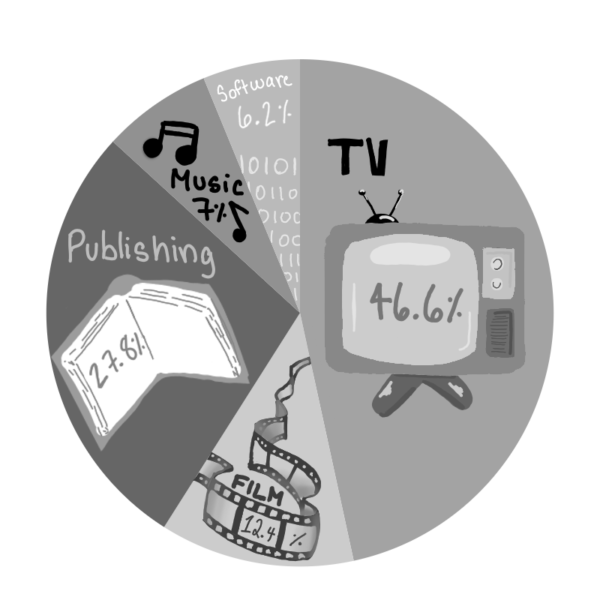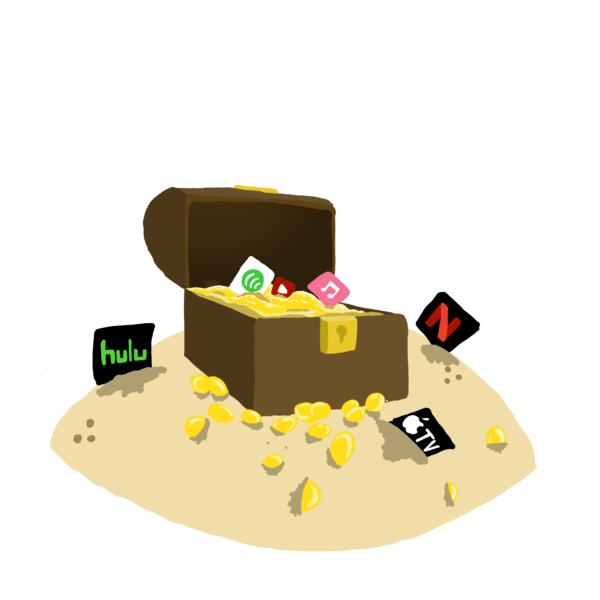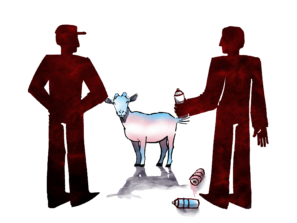
In 2023 alone, visits to online piracy websites skyrocketed to 141 billion, averaging a staggering 386 million hits every single day. According to data from MUSO, that’s a 12% jump from 2019.
Piracy isn’t just a niche activity — it’s part of the daily routine for millions of people around the world. But is piracy just a modern-day Robin Hood story, providing the masses with access to content they might not be able to afford? Or is it a digital heist that robs creators of their hard-earned revenue?
The primary driving force for corporations is profit. This economic incentive often leads to content being commodified and sold for profit, which can create barriers to access in areas of lesser availability. This creates a gap that piracy is able to fill.
“In … [many] cases, it just doesn’t make sense to pay for a [service],” said sophomore Patrick Gomm. ”To download songs on Spotify or Apple Music, you [still] … have to pay for cellular data usage … [Piracy is] kind of like free samples at Costco, you don’t have to pay … you can just take it.”

Among the industries most targeted by piracy, multi-billion dollar corporations like Sony, Microsoft and Disney have massive resources, meaning they can absorb some loss due to piracy without significantly affecting their operations or the livelihoods of their employees. Disney alone generated $82.7 billion in revenue in 2022, with its media division earning billions — largely outweighing the estimated $29.2 to $71 billion lost annually due to digital piracy in the US, according to the US Chamber of Commerce.
“I don’t want to download five different streaming services and then pay monthly subscriptions for the rest of my life,” said freshman Trevor Pulley.
Digital piracy can sometimes even benefit these large entities by introducing a form of “shadow competition,” which can prevent monopolistic pricing and encourage broader content consumption. Shadow competition refers to the indirect competition that arises when consumers use free or illegal alternatives, such as pirated content, which pressures large companies to lower prices or improve services. This can benefit big companies by preventing monopolistic pricing, which can eventually drive legitimate sales when consumers are drawn into the ecosystem and willing to pay for “exclusive” or premium content.
Contrast this with indie developers and small creators, who operate on shoestring budgets and often struggle to make a living from their work. For these individuals, every sale counts. When their games or projects are pirated, it directly impacts their income and, by extension, their ability to continue creating. Unlike large corporations, small developers don’t have financial cushions to absorb losses from piracy. The damage to their livelihood can be substantial, and it often means the difference between continuing their work or shutting down their projects.
On the other hand, piracy is also able to give smaller creators exposure. For example, indie games like Slay the Spire and Geometry Dash had weak initial launches but later gained a following over time and grew in popularity because of piracy.
Pirated content that’s being widely used or discussed can unintentionally generate buzz, raising awareness of a product or brand — even if the exposure was not through legitimate channels. This can apply to the research community, where paying for full access to articles has become increasingly common, which creates an environment where only those with financial resources can fully participate in the academic conversation. Piracy helps to increase academic literacy irrespective of someone’s socioeconomic status.
“Paywalls just continue to add on to that [wealth/knowledge] gap,” said senior Medha Rakesh. “Having all these paywalls … creates so much [disparity]. That’s not how knowledge should work.”
While piracy from multi-billion dollar corporations might be seen as less morally problematic, piracy affecting small indie creators poses significant ethical concerns. Striking a balance between access and respect for creators’ rights is essential.





